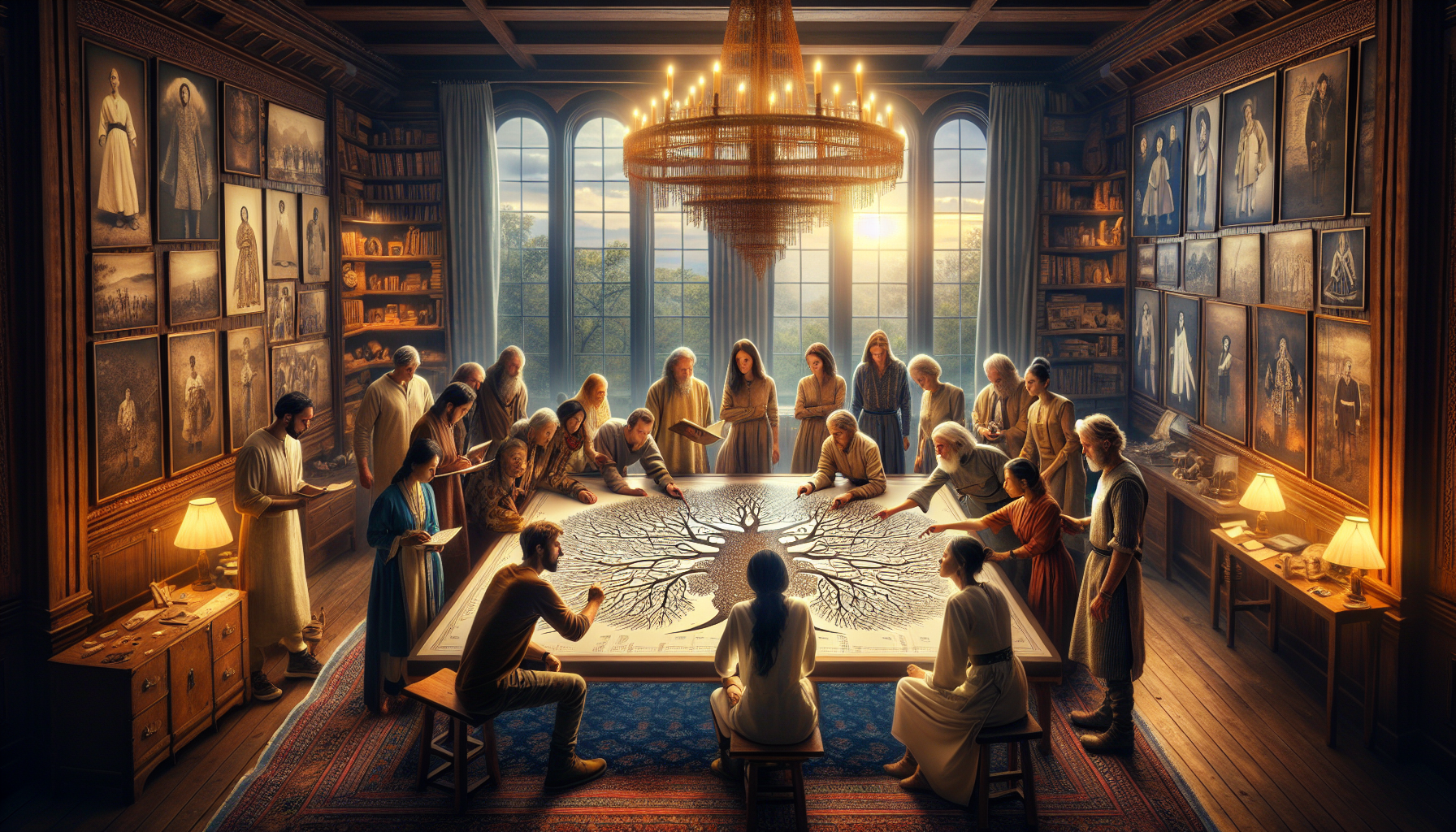In a world that often feels like it’s spinning faster with each passing day, where globalization blurs borders and cultures intertwine, there’s an undeniable pull to seek out the roots of our individuality. This journey into our past is more than just a quest for names and dates; it’s an exploration of the stories, the decisions, and the values that have been passed down through generations. Welcome to “Uncover Your Roots: Navigating Ancestral Approval Logic for a Deeper Understanding of Your Heritage.” This exploration isn’t just about filling in the branches of your family tree; it’s about discovering the logic and mindset of your ancestors and how these elements continue to shape your identity today. 🌳
Many of us walk through life with a set of beliefs and values that we may not fully understand or question. They seem to be etched into our very being, guiding our decisions, influencing our relationships, and shaping our worldviews. But have you ever stopped to wonder where these beliefs originated? Our ancestors lived in vastly different worlds, facing challenges and opportunities we can scarcely imagine today. By delving into ancestral approval logic, we unravel not only who they were but also why they thought and acted the way they did. Understanding this logic provides invaluable insight into their decisions and sheds light on the subtle ways these choices have trickled down through generations, impacting who we are.
In this blog post, we’ll embark on a captivating journey through the corridors of time, examining how ancestral approval logic can illuminate our understanding of heritage. We’ll explore the concept of approval logic, tracing its origins and evolution within different cultures. We’ll dive into the stories of individuals who have uncovered hidden truths about their lineage, revealing surprising connections and long-lost traditions. Moreover, we’ll provide practical tips on how you can begin your own exploration into ancestral approval logic, utilizing modern tools like DNA testing and historical research. By the end of this article, you’ll not only gain a deeper appreciation for your roots but also understand how they contribute to the tapestry of your identity. Get ready to connect with the past in ways you never imagined, and prepare to embrace the wisdom of those who came before you. ✨
The Significance of Ancestral Roots
Understanding one’s ancestral roots is a journey of discovery and self-realization. It goes beyond mere curiosity about where your family comes from; it’s an exploration into the depths of your identity and the collective experiences that have shaped who you are today. By navigating the intricate web of ancestry, you can unlock stories of resilience, migration, and survival that span generations. This understanding fosters a deeper connection to your cultural heritage, providing a sense of belonging and a grounding foundation in today’s rapidly changing world.
Ancestral approval logic refers to the frameworks and systems that have been passed down through generations, shaping the way families think, make decisions, and interact with the world. These systems can include beliefs, values, and traditions that have been instilled over time, offering guidance and stability. For instance, your family’s approach to work, relationships, or spirituality may have deep roots in ancestral approval logic, subtly influencing your daily life without you even realizing it.
The journey to uncovering your roots requires diligence, patience, and a willingness to embrace both the light and shadow aspects of your heritage. As you delve into your family’s past, you might encounter stories of hardship, loss, or trauma alongside tales of triumph and love. Each narrative adds a layer to your understanding, allowing you to appreciate the complexities of your lineage. Whether through oral histories, genealogical research, or DNA testing, piecing together your family’s story can be a transformative experience, encouraging personal growth and fostering a more profound appreciation for the legacy you’ve inherited.
Why Ancestral Approval Matters
Ancestral approval is more than just acknowledging the past; it’s about integrating the wisdom of previous generations into contemporary life. This approval can manifest as a guiding force, offering insights and direction during times of uncertainty. By aligning your actions with ancestral values, you create a bridge between the past and present, honoring the sacrifices and teachings of those who came before you. This alignment can lead to a sense of fulfillment and purpose, as you’re not only living for yourself but also upholding a legacy.
Moreover, understanding and honoring your ancestry can help you navigate cultural identity, particularly if you come from a background with diverse influences. For many, reconciling the different facets of their heritage can be challenging, but ancestral approval logic provides a framework for integrating these elements harmoniously. By exploring and embracing all parts of your ancestry, you cultivate a more comprehensive and nuanced identity, enriching your life experiences and interactions with others.
Research has shown that individuals who have a strong sense of their ancestry often experience increased self-esteem and resilience. Knowing where you come from can provide a sense of rootedness and continuity, essential for navigating the complexities of modern life. It allows you to draw strength from the achievements and lessons of your ancestors, empowering you to overcome challenges and pursue your goals with confidence.
Methods for Uncovering Your Roots
There are several avenues you can explore to uncover your ancestral roots, each offering unique insights and perspectives. Genealogical research is a popular starting point, involving the study of family histories and lineages. This can include examining birth and death records, census data, and historical documents to construct a family tree. With the advent of digital archives and online resources, accessing such information has become more convenient, enabling individuals to trace their ancestry across continents and centuries.
Another method is DNA testing, which provides a scientific approach to ancestry exploration. Companies like 23andMe and AncestryDNA offer services that analyze your genetic makeup to identify ethnic origins and connect you with potential relatives. While DNA testing can reveal surprising connections and heritage details, it’s essential to approach these results with an open mind and a critical understanding of the limitations and implications of genetic data.
Oral histories also play a crucial role in ancestral exploration. Engaging with family members, particularly elders, to gather stories and personal anecdotes can provide invaluable context and emotional depth to your family’s history. These narratives offer insights that official records may not capture, revealing the personal experiences and cultural nuances that have shaped your lineage. Recording and preserving these stories is vital for future generations, ensuring that the legacy of your ancestors continues to be celebrated and understood.
Tools and Resources for Genealogical Research
Several tools and resources can aid in your genealogical research, helping you uncover the threads of your family’s past. Below is a comparative table of popular genealogical websites, highlighting their key features and advantages:
| Website | Features | Advantages |
|---|---|---|
| Ancestry.com | Extensive database of records, family trees, DNA testing | Comprehensive resource with a vast collection of historical data |
| FamilySearch.org | Free access, family trees, historical records | Non-profit, extensive international records |
| MyHeritage.com | Family trees, DNA testing, photo colorization | User-friendly interface, strong European records |
For a deeper dive into these resources, watch the video below for tips on maximizing your genealogical research efforts:
“Genealogy: Tracing Your Family Tree” – Genealogy TV
Integrating Ancestral Wisdom in Modern Life
As you uncover your roots and understand ancestral approval logic, it’s essential to consider how this wisdom can be integrated into your modern life. The values and beliefs of your ancestors can serve as a compass, guiding your decisions and actions in alignment with your heritage. This integration requires a thoughtful approach, balancing the preservation of tradition with the flexibility to adapt to contemporary circumstances.
One way to integrate ancestral wisdom is through cultural practices and rituals. These activities, whether they involve celebrating traditional holidays, preparing ancestral recipes, or engaging in cultural crafts, allow you to connect with your heritage tangibly. They provide a sense of continuity, reminding you of the enduring legacy of your lineage while fostering a deeper appreciation for your cultural identity.
Additionally, consider how the lessons and experiences of your ancestors can inform your personal and professional life. For instance, understanding the resilience and adaptability that may characterize your family’s history can inspire you to approach challenges with a similar mindset. Embracing this perspective encourages personal growth and the development of a more profound sense of purpose, as you strive to honor the legacy of those who came before you.
Creating a Legacy for Future Generations
As you delve into your ancestral roots, consider how you can contribute to the legacy of your family for future generations. By documenting your findings and preserving your family’s stories, you create a valuable resource for those who will come after you. This documentation can take various forms, from written records and digital archives to multimedia projects and family trees.
- Record oral histories with family members.
- Compile a family cookbook with traditional recipes.
- Create a digital family tree with photos and documents.
By actively engaging in this process, you ensure that the stories and wisdom of your ancestors continue to inspire and guide future generations, fostering a sense of pride and connection within your family lineage. This legacy not only honors the past but also serves as a foundation for the future, providing a sense of continuity and belonging for years to come.

Conclusion
Navigating the intricate paths of our ancestry is a journey that uncovers more than just our familial lineage; it peels back layers of our identity and provides profound insights into who we are. In “Uncover Your Roots: Navigating Ancestral Approval Logic for a Deeper Understanding of Your Heritage,” we embarked on an exploration that connected our present to the lives and experiences of those who came before us. Let’s revisit the key elements we discussed, understand their significance, and reflect on the transformative power of this endeavor.
Understanding Ancestral Approval Logic
At the heart of our exploration was the concept of Ancestral Approval Logic. This idea delves into the implicit and explicit expectations passed down through generations. By examining these inherited values and norms, we gain clarity on how they influence our decisions, relationships, and worldviews today. This logic is not merely a set of rules; it is a living narrative that shapes our behavior and identity. By recognizing these influences, we can better understand why we might feel drawn to certain paths or why we encounter internal conflicts when deviating from familial expectations.
The Role of Genealogy in Heritage Exploration
We also highlighted the crucial role of genealogy in tracing our heritage. By utilizing modern tools and resources, such as DNA testing and genealogical databases, we can construct detailed family trees that map out our ancestral journeys. These tools have revolutionized our ability to connect with distant relatives and uncover forgotten stories that contribute to our familial tapestry. Genealogy is more than just names and dates; it is a powerful tool for storytelling and connecting the past with the present.
Cultural and Historical Contexts
Additionally, placing our ancestors’ lives within broader cultural and historical contexts allows us to appreciate the challenges and triumphs they faced. Understanding the historical backdrop of our ancestors’ lives gives depth to their stories and highlights the resilience and adaptability of human spirit. Whether they migrated across continents or persevered through socio-economic upheavals, their experiences provide valuable lessons and inspiration for us today.
The Emotional Journey
Exploring our roots is not solely an intellectual pursuit; it is deeply emotional. As we piece together fragments of our family history, we often experience a range of emotions, from pride to sorrow. These emotions are a testament to our connection with our ancestors and the legacy they have left us. Acknowledging these feelings is essential for healing generational wounds and embracing the strengths passed down through generations.
Why This Exploration Matters
The importance of uncovering our roots extends beyond personal satisfaction. By understanding our heritage, we foster a sense of belonging and identity that is crucial in today’s interconnected world. This exploration encourages empathy and tolerance, as it highlights the shared human experiences that transcend time and geography. In a world where diversity and inclusion are increasingly valued, understanding our own diverse backgrounds can empower us to appreciate and celebrate the rich tapestry of human cultures.
Taking Action and Sharing Your Journey
The knowledge gained from ancestral exploration is not meant to remain static. It serves as a catalyst for personal growth and societal understanding. I encourage you, dear reader, to take action with the insights you have gathered. Whether it means having deeper conversations with family members, preserving family stories, or exploring new facets of your cultural heritage, each step you take contributes to a greater understanding of yourself and the world around you.
Join the Conversation
As we conclude this enlightening journey, I invite you to share your own experiences and reflections. What have you discovered about your ancestry that has reshaped your understanding of who you are? How have you integrated these insights into your life? By sharing your story, you contribute to a collective narrative that enriches our understanding of human heritage. 💬
Conclusion
In unraveling the threads of our ancestry, we find more than just historical facts; we uncover a rich tapestry of stories, values, and lessons that guide us. The journey into our past is a bridge to our future, offering insights that illuminate the path ahead. Let this exploration inspire you to delve deeper, to question, and to connect with your roots in meaningful ways. By doing so, you not only honor your ancestors but also pave the way for future generations to continue the legacy of discovery and understanding. 🌿
For further exploration, consider accessing online genealogical resources like Ancestry and FamilySearch to start or expand your family history research.
—
(Note: Make sure to verify the current activity and content of these links as they may change over time.)
Toni Santos is a visual storyteller and cognitive explorer whose work delves into the mental landscapes of ancient cultures—revealing how different civilizations perceived reality, memory, and meaning long before modern psychology existed. Through symbolic imagery and narrative inquiry, Toni brings to life the divergent ways of thinking that shaped lost worlds.
His creative path is guided by a fascination with non-linear logic, oral cosmologies, and the mythic frameworks that once guided decision-making, emotion, and identity. From memory temples carved in stone to visual languages encoded in textiles, every piece Toni creates reflects the vast cognitive diversity of the human story.
With a foundation in visual design and cultural semiotics, Toni blends analytical depth with artistic expression. His work goes beyond historical reconstruction—it reawakens the embodied, intuitive, and ritual-based intelligence of ancient minds, inviting us to question the assumptions of modern thought.
As the mind behind Vizovex, Toni curates visual studies, essays, and immersive content that explore forgotten epistemologies—ways of knowing that connected people to myth, land, and each other in profoundly different ways.
His work is a tribute to:
The symbolic intelligence of pre-modern cultures
The neural diversity embedded in ancient rituals and storytelling
The deep memory systems that shaped identity and perception
Whether you’re a researcher, an artist, or a seeker of hidden wisdom, Toni invites you to enter a space where cognition is culture, and where the past speaks through signs, cycles, and symbols—one myth, one memory, one mind at a time.





